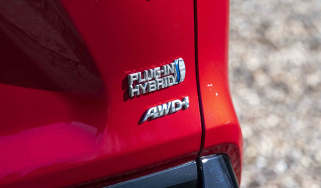What is PCP car finance? Personal contract purchase explained
PCP car finance can make buying a new or used car more affordable – here’s how it works

Personal Contract Purchase (PCP) finance has become one of the most popular ways to buy a new or used car in the UK. Unlike a cash purchase, where you pay the full price of the car in one lump sum, PCP finance lets you spread the cost over an agreed number of months.
 Best new car deals 2025: this week’s top car offers
Best new car deals 2025: this week’s top car offers
It’s these low monthly instalments that make PCP finance deals so attractive. The payments are fixed and easy to factor into a monthly budget, while you have the option to hand the car back or keep it for a fee at the end of the agreement. This is similar to other car finance methods, such as Personal Contract Hire (PCH) and Hire Purchasing (HP), but there are some key differences to be aware of that we’ll cover in this guide.
When buying a new car, there’s more to consider than just your payment method. Our car choosing guide will help you narrow down the right model for you, while we’ve also covered the top tips for buying a used car.
What is Personal Contract Purchase (PCP) car finance?
PCP car finance is a method that allows you to purchase a new or used car with a set number of monthly payments, rather than one upfront cash payment. It’s broken down into three key elements:
- An upfront deposit
- An agreed number of monthly payments
- An optional final ‘balloon’ payment
The customer pays an upfront deposit towards the cost of the car. This is followed by a set number of monthly payments, usually over a period of one to four years. Once the term comes to an end, the customer can choose to hand back the car and walk away, or pay the final ‘balloon’ payment and keep the car. In most cases, the upfront deposit can be adjusted, with the following monthly payments increasing or decreasing depending on how much you put down initially.

Today, the majority of franchised main dealers offer PCP deals on new cars. It’s also common to find PCP deals for used cars, but these deals often aren’t as attractive as new car deals. This is because manufacturers are keen to promote new car sales, so they will usually offer tempting finance deals with low interest rates or deposit contributions to secure buyers.
How does PCP car finance work?
When you agree to a PCP car finance deal, you’re not paying towards the ‘purchase price’ of the car. Instead, your monthly payments cover the depreciation that the car will experience over the length of the agreement.
Car depreciation is the loss in value that practically every car experiences as it gets older. A brand new car won’t be worth the same amount of money after three years, but this loss in value can be predicted. In a PCP deal, the upfront deposit and monthly payments cover this predicted loss in value.
When the PCP deal ends, you have the option to walk away and hand the car back to the dealer. Alternatively, you can pay the final balloon payment, which allows you to buy the car at its remaining value. The process is slightly more complex in reality, involving fees, interest and ‘equity’.
When a dealer prepares a three-year PCP agreement, they use a prediction of what the car will be worth in three years’ time. This estimate is provided by the finance house underwriting the agreement and is referred to as a Guaranteed Minimum Future Value (GMFV).
Let’s look at a simplified example without taking into account the fees and interest that most PCP schemes will encompass.
- A new car costs £25,000
- The GMFV after three years is set at £15,000
- Over three years, you need to cover £10,000
- You pay an upfront deposit of £1,000
- You’ll pay the remaining £9,000 over 36 monthly payments of £250
In reality, most dealers charge interest on the £9,000 that you are covering with your monthly payments. Most PCP deals come with a processing fee, too.
What happens at the end of a PCP agreement?
During the PCP agreement, you don’t own the car. Your V5C document may say that you’re the registered keeper, but the finance company maintains property rights. When you reach the end of your PCP agreement, you will usually have three option:
- Pay the ‘balloon’ payment to purchase the car outright from the finance company
- Hand the car back and walk away, paying nothing and owning nothing
- If the car is worth more than the GMFV (i.e, you have paid more than the car has lost in value), you can use this difference towards the deposit on a new car, possibly on another PCP deal
Dealers often set the Guaranteed Minimum Future Value (GMFV) deliberately low – less than the car’s actual value will be at the end of the contract – so customers end up paying more than the car has lost in value. This overpayment is referred to as ‘equity’, and can be used to contribute towards the deposit on a new PCP deal. However, you won’t be able to reclaim this overpayment in cash, and you won’t be able to use it towards the deposit for a new PCP deal at a different dealership.
Some PCP deals have higher GMFVs to keep the monthly repayments attractively low, although this means the customer won’t have any equity to contribute towards their next PCP deposit.
If you love your current car but can’t pay the GMFV in one go, some lenders will let you refinance it over several more years. Because of the age of the car at that point, you’ll be offered a Hire Purchase deal, which could make your monthly payments higher than the original deal. Bear in mind that you’ll be paying your car off over a long period of time – it’ll continue to lose value and you’ll have paid more interest than if you’d have taken out a HP agreement at the start.
Personal Contract Purchase (PCP) vs Hire Purchase (HP)
Hire Purchase (HP) finance is very similar to PCP finance on the surface. In both cases, you pay an upfront deposit and then a set of fixed monthly payments over an agreed period of time. However, there is no final balloon payment in an HP agreement – once you’ve paid the final instalment, the car is yours to keep.
That’s because your deposit and monthly instalments are paying towards the ‘purchase price’ of the car in an HP finance deal, whereas the payments in a PCP deal contribute towards the car’s depreciation. You will usually be financing a much larger amount of money with an HP deal, so the monthly payments are likely to be higher than those in a PCP deal.
HP finance deals typically run for the same length as a PCP arrangement and you’ll have to pay interest rates and processing fees here, too.
Personal Contract Purchase (PCP) vs Personal Contract Hire (PCH)
Personal Contract Hire (PCH) is different as there is no option to keep the car at the end of the deal – you are essentially leasing the car for the term. This is a good option if you like to upgrade to a new car every few years. The monthly payments are similar to those for a PCP deal, and can be adjusted in the same way by increasing or decreasing the upfront deposit.
You can find our expert picks of the best PCH deals available here.
Choosing the right PCP agreement for you
When setting up a PCP agreement, you need to decide on the length of the agreement, the size of your deposit and the number of miles you’ll cover a year. You can shop around to get the best interest rate, but the GMFV is likely to be the same wherever you go.

The GMFV will be affected by the length of the finance agreement and the car’s mileage at the end of the term. The older the car and the higher the mileage, the less it’ll be worth.
Before you’ve signed a PCP scheme, be certain that you want to complete the full length of the agreement. If you’re someone who is likely to change their car after two years, don’t finance it over three or four. That’s because the GMFV will be calculated based on a model that follows the depreciation curve your car is predicted to follow. Depreciation is most severe in years one and two, but starts to level out by the third year.
That means if you want to change your car two years into a three-year agreement, it’s unlikely you’ll have paid enough to cover its depreciation – meaning you’ll have to cover the shortfall.
If you do wish to leave your PCP agreement early and hand back the car, you are legally entitled to voluntary termination. So long as you have already paid back 50% of the total amount payable, you won’t have to pay any additional fees. But be warned, this total amount includes interest as well as the final ‘balloon’ payment. This can end up being a large sum of money that many people will not have paid back until near the end of their agreement. In this case, you would have to pay the outstanding amount to make up the 50%.
Getting your monthly PCP payments right
When agreeing to a PCP deal, it’s important to find the right balance between your upfront deposit and monthly payments. Most finance deals will charge interest on your monthly payments, so the higher these are, the more the deal is likely to cost in total.
How much you pay upfront can affect how easy or difficult it is to leave the PCP deal early. As mentioned above, you can only hand the car back early if you have paid off at least 50% of the total amount payable (the combined cost of the fees, upfront deposit, monthly payments, interest, and final balloon payment). By paying a large upfront deposit, you will have already contributed a large chunk towards that 50% value. Conversely, by spreading out the total cost with higher monthly payments, it might take longer to reach that 50% value, and therefore take longer until you can leave the deal.
If you still wish to leave the deal early but you haven’t paid off 50% of the total amount payable, you’ll have to make up the shortfall. That could end up being a large sum of money – not ideal if you want to leave the deal because you’re struggling to keep up with the monthly payments.
36-month PCP worked example
Let’s refer to our example of a car costing £25,000 and assume, for simplicity’s sake, you’ve managed to get an interest-free PCP deal. Here’s how the costs break down.
- A new car costs £25,000
- £2,500 deposit (decided by you, but 10% of the car’s new value is common)
- A GMFV of £15,000
- £7,500 finance, covered by your monthly repayments; £208 a month over three years without interest
- £15,000 optional GMFV balloon payment
After three years, if your car is worth less than the GMFV, you won’t be left out of pocket. As its name suggests, the finance company has guaranteed that £15,000 value – if it’s worth less, the finance company will absorb that cost.
If the car is worth more than the GMFV, meaning you have paid back more than the car has lost in value, you can contribute the extra you’ve paid – known as ‘equity’ – towards the deposit on a new finance deal for a new car. Unfortunately, you’re not allowed to take that extra cash and give back the car.
What are my commitments with a PCP agreement?
Like any contract, a PCP agreement comes with certain stipulations. When taking out a PCP deal, you’re typically bound to:
- Service the car according to the manufacturer’s recommendations
- Keep the car in good condition
- Not exceed a specified mileage over the course of the contract
- Take out a fully comprehensive insurance policy
Exceeding the mileage limit is allowed but will incur an additional charge. This could be between 5p and 10p a mile, which can quickly add up. Doing 1,000 excess miles at 10p a mile would cost £100, for example. PCP contracts are also realistic about what constitutes ‘good condition’: the car doesn’t have to be showroom-perfect, but a massive dent in the door will cost you.
Many dealers provide the option of taking out insurance when you’re agreeing to the contract. This can be expensive and likely won’t be the best deal, so shop around other insurance providers.
It’s also worth investing in GAP insurance to protect yourself financially if the car is written off during the course of the PCP agreement. Again, these policies are often cheaper from third-party companies.
What are the advantages of PCP deals?
- PCP deals usually come with lower deposits and lower monthly repayments than traditional HP agreements, meaning you can get a more expensive car for less money upfront and less each month.
- People also like the idea that, at the end of a PCP agreement, the GMFV is often less than the car’s value. This means you can potentially drive away in a new car every three years or so, without having to come up with a full deposit.
- Like most PCP agreements, most new-car warranties run for three years. This means that if you switch cars when the PCP deal expires, you’ll always be covered by the protection offered by a manufacturer warranty.
- Another advantage is competition between carmakers and their financial branches is fierce. Many manufacturers offer deposit contributions, guaranteed trade-in values (useful if you’re upgrading from an elderly car) and even 0% interest on PCP deals, meaning there are lots of opportunities to save money if you shop around.
What are the disadvantages of PCP deals?
- For some, the idea of making monthly repayments without actually receiving a tangible asset at the end of the contract means PCP deals are unappealing.
- Others feel uncomfortable with the large GMFV ‘balloon’ payment hovering over their heads for the duration of the agreement. If you recognise yourself here, investigate a hire purchase agreement. You may be faced with higher monthly payments and a higher deposit, but, once the final monthly payment is made, the car will be yours.
- High GMFV values can mean you have less money to go towards the deposit on a new car than you might hope at the end of a PCP agreement. While it can be sensible to use the difference between the car’s value and the GMFV as the deposit on a new PCP deal, there can be a sense of feeling committed to doing this
- Another disadvantage of PCP deals is that it’s not generally easy to switch brands and take any ‘equity’ accrued to another carmaker.
- Finally, it’s vital any PCP you enter into truly reflects your likely circumstances. When entering into a contract, remember that it has been designed for a specific term. If you’re likely to change your car yearly, don’t enter into a contract where payment continues for several years. A subscription service might be better if you want to switch cars regularly.
For more car buying advice, read our 20 tips for buying a car from a dealership…
Recommended

Best car leasing deals 2025: this week’s top PCH offers

Petrol and diesel car ban relaxed with hybrids permitted beyond 2030

Classic car tax exemption: which historic vehicles qualify?
Most Popular
Tips & advice

Car dashboard warning lights: what does each symbol mean?

Electric car charging stations: public networks, charger types, apps and maps







